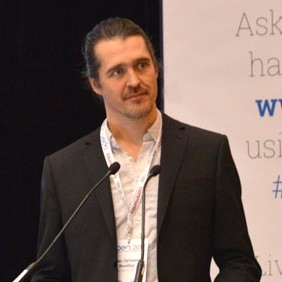 Holochain is a new technology project with huge potential for the cooperative economy. Members of The Open Co-op have been promoting the idea that new software could, potentially, revolutionize both our failing democracies and our predatory capitalist economies, since 2004. Back then we weren’t quite so clear on exactly how the required information architecture should be designed – but we knew what we wanted it to do and how it should work. In 2004, I published a paper entitled Participatory Democracy Networks, which explained how I thought some new information architecture could facilitate participatory democracy worldwide.
Holochain is a new technology project with huge potential for the cooperative economy. Members of The Open Co-op have been promoting the idea that new software could, potentially, revolutionize both our failing democracies and our predatory capitalist economies, since 2004. Back then we weren’t quite so clear on exactly how the required information architecture should be designed – but we knew what we wanted it to do and how it should work. In 2004, I published a paper entitled Participatory Democracy Networks, which explained how I thought some new information architecture could facilitate participatory democracy worldwide.
non-governmental organizations (NGOs)
See the following -
11 Ways To Get Involved With Humanitarian FOSS
 Lending a digital hand for humanitarian projects is just a click away. Whether you have five minutes or a few hours, you can make a difference with a variety of Humanitarian Free and Open Source Software (HFOSS) projects. The level of skills required vary from web search, verification, mapping, translation, training, and open source software development. Along the journey of changing the world, you can meet like minds and hone your skills. The key is to ask yourself: What do I want to do? How can I get started? How can I find the right project and community?
Lending a digital hand for humanitarian projects is just a click away. Whether you have five minutes or a few hours, you can make a difference with a variety of Humanitarian Free and Open Source Software (HFOSS) projects. The level of skills required vary from web search, verification, mapping, translation, training, and open source software development. Along the journey of changing the world, you can meet like minds and hone your skills. The key is to ask yourself: What do I want to do? How can I get started? How can I find the right project and community?
- Login to post comments
5 Humanitarian Crises Where Open Source Projects Aimed to Bring Stability Government Software
Natural disasters, epidemics, terrorism, and uprisings—the world awaits with bated breath for the situation to turn to normalcy for those directly and indirectly affected by these crises. Here are five crises where open source technologists have helped, in some way, to bring stability in these hostile regions. An annoyed user couldn’t fix his printer as the printer’s source code wasn’t available to users. This was the reason that led to the start of the open source movement...
- Login to post comments
AFRICOM Plans High-Speed Circuits To Liberia
The U.S. military plans to lease a 622 megabit terrestrial circuit from Europe to Liberia in a matter of weeks to support Internet service for U.S. troops as they continue to deploy to Liberia to help counter the Ebola virus, U.S. Africa Command’s top communications official told Nextgov...
- Login to post comments
Ebola Crisis: How Health Workers On West African Frontline Are Paying With Their Lives
...That Nigeria has so far emerged relatively unscathed from its brush with Ebola owes much to the quick-thinking staff at an ordinary family clinic, who put themselves in the firing line for six days before the government was ready to relocate him. And, as elsewhere in this epidemic, those on the frontline paid the highest price: four of the seven fatalities were health workers, including Adadevoh...
- Login to post comments
Gates Foundation Focuses $3bn Agro-Fund On Rich Countries, ‘Pushes GMO Agenda In Africa’
The Bill & Melinda Gates Foundation gives the majority of its $3 billion in food and agricultural grants to rich Western countries, with critics accusing it of using its money to force a pro-GMO agenda on Africa, a recent report suggests...
- Login to post comments
Gates Foundation Spends Bulk Of Agriculture Grants In Rich Countries
Most of the $3bn (£1.8bn) that the Bill & Melinda Gates Foundation has given to benefit hungry people in the world’s poorest countries has been spent in the US, Britain and other rich countries, with only around 10% spent in Africa, new research suggests...
- Login to post comments
Holochain – the Perfect Framework for Decentralized Cooperation at Scale
- Login to post comments
How "Open Source" Seed Producers from the U.S. to India Are Changing Global Food Production
 Frank Morton has been breeding lettuce since the 1980s. His company offers 114 varieties, among them Outredgeous, which last year became the first plant that NASA astronauts grew and ate in space. For nearly 20 years, Morton’s work was limited only by his imagination and by how many different kinds of lettuce he could get his hands on. But in the early 2000s, he started noticing more and more lettuces were patented, meaning he would not be able to use them for breeding...
Frank Morton has been breeding lettuce since the 1980s. His company offers 114 varieties, among them Outredgeous, which last year became the first plant that NASA astronauts grew and ate in space. For nearly 20 years, Morton’s work was limited only by his imagination and by how many different kinds of lettuce he could get his hands on. But in the early 2000s, he started noticing more and more lettuces were patented, meaning he would not be able to use them for breeding...
- Login to post comments
How FrontlineSMS, SFCG Nigeria Created A Conflict Early Warning System For Nigerians
...SFCG Nigeria is part of Search for Common Ground, one of the first and largest conflict resolution-focused NGOs. In Northern Nigeria, SFCG partnered with Community Action for Popular Participation (CAPP) to develop an Early Warning System (EWS) funded by the US Institute for Peace (USIP)...
- Login to post comments
How Indonesia Bounced Back From A Devastating Tsunami A Decade Later: Elizabeth Frankenberg And Duncan Thomas (Opinion)
...After the tsunami, the Indonesian government, donors, NGOs and individuals contributed roughly $7 billion in aid for Aceh, and the government established a high-level bureau based in Aceh to coordinate recovery. What did these resources buy?...
- Login to post comments
How Technology Can Help Mitigate Hurricane Harvey-Like Disasters
Unfortunately, we don’t yet have technology that can prevent a storm of the magnitude of Hurricane Harvey from devastating our cities and towns. But it can help in the response, and even provide valuable information for citizens trying to survive a catastrophic event. One key is properly locating backup and recovery systems for government agencies. Typically, most cities and towns with a backup plan for their data rely on nearby data centers. That’s fine if there is a fire at the local office building or something that forces the temporary closure of government buildings...
- Login to post comments
How Ushahidi Maps The Voices Of Those In Need
Dominic Burbidge discusses how Ushahidi’s transformative crowdsourcing techniques have alleviated crises in Kenya and beyond. Read More »
- Login to post comments
Hype Around NGO-Funded Apps Is Stifling Africa's Innovation
The Silicon Savannah brings to mind a hyper-tech innovation zone, a mini-city of mirrored buildings ringed by sandy sub-Saharan scrub. Closer to the truth is a handful of industrial-style offices that occupy the top-floors of mirrored buildings and overlook a traffic-clogged Nairobi city artery called the Ngong Road. Read More »
- Login to post comments
Mortal Coils: Why We Must Stop Tolerating Failing Health Tech
 Today, data are scattered across thousands of database tables within any single electronic medical record (EMR) system, but also across dozens of other systems that hold pharmacy data, imaging data, insurance data, laboratory data, etc. Pretty much none of it is available on demand in any given clinical setting. The inevitable result of this disconnected galaxy of data "black holes" is mistakes, or if not outright mistakes, well-intentioned missteps based on lack of background data within the acute-care setting.
Today, data are scattered across thousands of database tables within any single electronic medical record (EMR) system, but also across dozens of other systems that hold pharmacy data, imaging data, insurance data, laboratory data, etc. Pretty much none of it is available on demand in any given clinical setting. The inevitable result of this disconnected galaxy of data "black holes" is mistakes, or if not outright mistakes, well-intentioned missteps based on lack of background data within the acute-care setting.
- Login to post comments
Nominations Open For "Open Source For America" Awards
Open Source for America (OSFA), an organization of technology industry leaders, non-government associations, and academic and research institutions promoting the use of open source technologies in the U.S. Federal Government, today announced the opening of its nomination period for its annual OSFA awards.
- Login to post comments